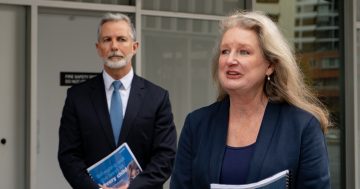
St Vincent’s Primary School Assistant Principal Monique Egan with students. NAPLAN results confirm the success the school is having. Photo: Catholic Education.
The evidence is mounting that the explicit or direct teaching model being adopted by the Catholic system and other private schools is making a difference to students, and teachers, who are excited by the results they are getting.
While the ACT Education Directorate and Minister Yvette Berry will argue that the Territory’s public school teachers deploy both explicit teaching and inquiry-based learning, the emphasis is on the latter.
Inquiry-based learning has gained ascendency in recent years due to its attractions of encouraging student autonomy, cultivating self-motivation and self-discovery, and developing study and research skills.
This student-centred approach fits neatly with the democratisation of schools and the notion of children having their own agency in a free society.
All well and good, but falling standards of literacy and numeracy and growing numbers of children slipping through the cracks or being left behind have prompted a rethink among educators.
In the Canberra region, Catholic school authorities, alarmed at what they were seeing, decided to adopt explicit teaching three years ago as their dominant approach, particularly in primary schools.
School leaders such as Monique Egan at St Vincent’s Primary School Aranda are convinced that the change is paying off, with more engaged and happier students and teachers, and improved results such as the recent NAPLAN data.
Some might call it simply going back to old-fashioned good teaching but don’t brand it back to basics, because practitioners say it is much more sophisticated and science-based than that.
They also say that it is not a rejection of inquiry-based learning but a recalibration of teaching strategies, arguing that one cannot ask primary school children to self-discover without being given foundation knowledge or the keys to learning to work with.
Another key is a constant revision of content so learning sticks.
It restores the teacher and the classroom to their rightful roles as the font and seat of learning, in a world where it is too easy to assume that technology can do everything or that children can find their own way.
Inquiry-based learning asks a lot of children, whose critical thinking skills are undeveloped, and it is no wonder that some flounder.
Educators need to think about what is appropriate and relevant to the age and developmental stage of their students.
Of course, in a place as privileged and advantaged as the national capital, inquiry-based learning should suit a population with highly educated, well-paid and resourced households.
Yet in spite of this glaring advantage, the ACT performs roughly on par with NSW and Victoria in NAPLAN, masking what many have called years of underperformance.
Ms Berry and the teacher unions remain resistant to changing the current teaching culture in ACT public schools, pointing the finger at social disadvantage as the main determinant in education outcomes.
It is true that the betrayal of the Gonski reforms has entrenched perverse inequality in Australia’s school landscape but most Catholic primary schools are hardly rich and ACT public schools are not without resources.
Ironically, it is children in poorer areas, like some NSW parts of the Catholic diocese, who were struggling with inquiry-based learning but have now turned the corner under the new model.
The ACT is halfway through the 10-year Future of Education strategy, which of course offers a strong focus on literacy and numeracy, but also stresses students having a greater say in their own learning and more project-based learning to develop inquiry skills.
Catholic Education Canberra and Goulburn Diocese is collecting the evidence, including a longitudinal study, and it is time ACT Education Directorate began taking notice, because something is working for the schools that have made the change, and there is no need to persevere with something that is looking increasingly flawed.
Refusing to change because of ideology or a belief that inquiry-based learning is part of the progressive project and the alternative is regressive does no service to families that should expect their children to receive the best education in the country.
What matters is what works. It is no comfort to parents or their children when for no particular reason reading is a problem or mathematics is a mystery.
The country is also in the midst of a teacher shortage, with high rates of burnout and disenchantment. The nation invests four years into teaching degrees for many to come out ill equipped for the classroom and then not get sufficient results to sustain the passion that motivated them in the first place.
It’s not all about the money. Yes, teachers deserve to be paid well, and in the ACT they are, but like any endeavour you need to taste success to continue.
A reset in the universities and our schools may not only lift standards but also help keep teachers in the profession.





















